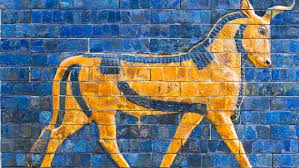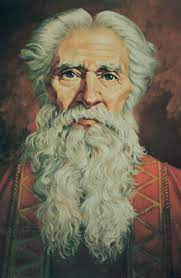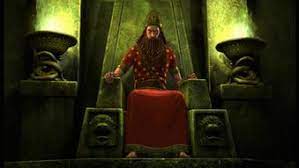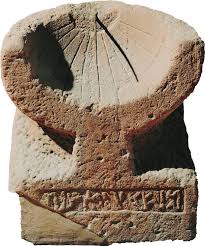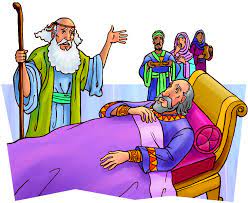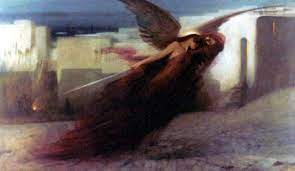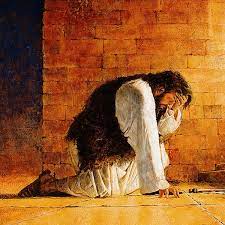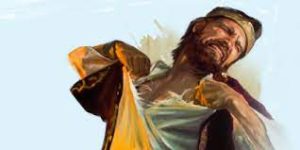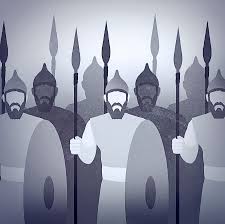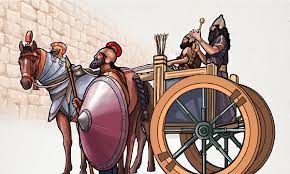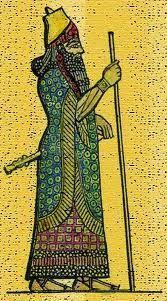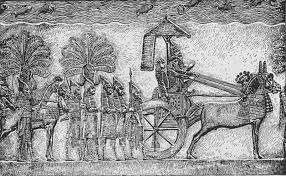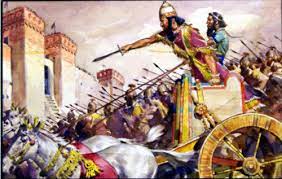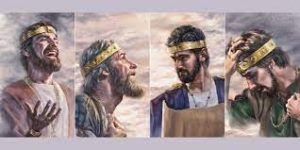Hg – He Sits Enthroned Above the Circle of the Earth 40: 18-26
He Sits Enthroned Above the Circle of the Earth
40: 18-26
He sits enthroned above the circle of the earth DIG: Does the Bible teach that the world is flat? Is any image or standard of comparison adequate to measure God’s worth? Why or why not? How does Isaiah approach the topic of idols? What is the point He is making?
REFLECT: What grass and flowers 40:6, or idols in 40:19 of this world seem awfully powerful to you today? How much do you depend on them? By comparison, do the promises of God just seem like words right now, or do they provide you with hope? Why? What sort of complaints do you hear today from non-believers? From believers? How might you answer them from the truths of this chapter? When have you most recently felt like God must have lost your address or phone number? What fears and thoughts arose in your mind? How might the truths of this chapter help restore strength to you?
This section introduces the conclusion to the previous arguments that the LORD was both interested and capable of saving Isra’el despite the fact that they continued to wallow in their sin (to see link click Hf – Surely the Nations Are Like a Drop in the Bucket). Isaiah knew he was called to minister to a stubborn and stiff-necked people (48:4). From the very beginning ADONAI told him that the Israelites would be ever hearing but never understanding, ever seeing but never perceiving (6:9). But I’m sure that didn’t make it any easier for the prophet to see his beloved people turn their backs on God at every opportunity.
This section, then, introduces the conclusion to the previous arguments as indicated in the opening word waw, meaning so or then. If it is true that ADONAI is absolutely alone in His creation and maintenance of the world, and if it is true that the Gentile nations are nothing when compared to Him, what image can He be compared to? What one thing from all of creation could be used for that purpose?
Isaiah then asked the question: So, to whom then, will you compare God? The word for God here is translated El, not the more common ELOHIM. The difference between the two is that while ELOHIM speaks of His general qualities, El would remind the Jews of the pagan high god of the Canaanite pantheon with the same name. By using this name Isaiah would leave no doubt of the absolute superiority of ADONAI over any such imposter (43:12; 45:14, 46:9 and 31:3). Since He alone is El, then there is nothing or no one like Him in all the universe.
What image will you compare Him to (40:18)? It has been said that this verse is the culminating experience of Hebrew monotheism found in the Scriptures. The context of this verse is idolatry. In other words, God is saying, “How can you compare Me with idols?” The point here is not how God or idols look, but what is the character of each.
But incredibly, Muslims teach that 40:18 and 25 (and also Psalm 89:6 and Jeremiah 10:6-7) contradict Genesis 1:26 where God said: Let us make man in our image, in our likeness. Is this a contradiction? Certainly not. Because we are not made with the same character as God. If that were true then we would indeed be God. But we are not God and God does not dwell in idols. That is the point made here in Isaiah, the incomparableness of the LORD to anyone or anything. This has nothing to do with us being made in the image of ADONAI. God’s Word is true when it says that the god of this age has blinded the minds of unbelievers, so that they cannot see the light of the gospel of the glory of Christ, who is the image of God (2 Cor 4:4).
Of all the comparisons to ADONAI that one might choose, the most ridiculous to Isaiah was an idol. The prophet ridiculed that thought several times in his book (41:6-7, 44:9-20, 46:5-7). He reserved his deepest sarcasm to show how foolish it was to try to make a god out of worldly material. As for an idol a craftsman casts it, and a goldsmith overlays it with gold and fashions silver chains for it (40:19). Humor and irony are used here. Some people were able to buy expensive gods, wood overlaid with gold and silver. Others had to buy cheap ones. But some were so poor they had to actually make their own idol from scratch.
A man too poor to present such an offering selects wood that will not rot. He looks for a skilled craftsman to set up an idol that will not topple (40:20). There was a three-stage process. First, they went out in the forest and looked for wood that would not rot. For it is not nice for gods to rot. Secondly, he would choose a skillful carver to make the god look nice. For it is not nice for gods to look ugly. Thirdly, he made sure he built a strong base for the god to stand on because it is not nice for gods to topple over. . . irony and humor are heavy. It is not nice for gods to rot, it’s not nice for gods to look ugly, and it’s not nice for gods to topple over. So therefore, you, skillful worker, make sure you do a good job with this piece of wood and make me a really nice-looking god. Will the Creator, who made the heaven and the earth without any help, be represented by an idol made by a skilled craftsman from the stuff of creation and then cannot be trusted to stand up without toppling over?
Then Isaiah brings out God’s sovereign control over the world. From His sovereign position in heaven God watches over His created universe. He is the God of eternity and speaks to Gentile idolaters about His eternity. Again, Isaiah asks a series of rhetorical questions: Do you all not know? Have you all not heard? Do you all not know? Has it not been told you from the beginning? The issue is intensified with the use of the imperfect with the verbs knowing and hearing. The Septuagint translates it: Will you not know? Can you not hear? It was not only a question of being aware that the LORD transcends the world, but whether those hearing believed Isaiah’s message. It was, and is, possible to hear the message but to refuse to act on it.
From the questions of intent and response Isaiah moves to questions of fact. Have you not understood since the earth was founded (40:21)? From the beginning (Genesis 1:1), from the very foundations of the earth, God was there. Isaiah questions how people could even imagine building their own little god out of wood that would eventually rot and then believe it created the heavens and the earth? The creation of the earth begs for a Creator. If the cosmos had an origin it could not itself be responsible for that event. The current “big bang” theory for the beginning of the earth still does not address the origin of the stuff of the “bang.” Isaiah contends that God is behind it all, and nothing that is part of creation, whether gods or humans, can thwart His plans.

It is He that sits enthroned above the circle of the earth, and its people are like grasshoppers (40:22a). One of the statements of liberal critics is that the Bible says that the world is flat. That is utterly ridiculous. In fact, the Bible says the opposite, but scientists during the days of Christopher Columbus taught that theory. Those so-called scientists did not pay attention to the Word of God and missed something. And I think they are missing something today. It is clearly stated that ADONAI sits above the circle of the earth and looks down at the inhabitants of the earth, who appear to be little tiny grasshoppers. He stretches out the heavens like a canopy, and spreads them out like a tent to live in (40:22b). The heavens are pictured as spread out like a tent for Him to live in (Psalm 104:2). Isaiah was not offering a detailed picture of God’s dwelling place. He was merely using imagery that his readers would easily understand.
He brings princes to naught and reduces the rulers of this world to nothing (40:23). Even the destinies of the greatest are in the hands of God, and their very existence, without His protection, is like stubble in the whirlwind. In controlling history God establishes rulers and removes them (Dani’el 2:21). They are easily removed. No sooner are they planted, no sooner are they sown, no sooner do they take root in the ground, than he blows on them and they wither, and a whirlwind sweeps them away like chaff (40:24). When God removes them, it is as if they had never been. All it takes is the breath of the LORD. With one breath He can remove the most powerful of men because God is sovereign over the rulers of this world.
Finally, God asks: To whom will you compare Me? Or who is My equal? says the Holy One (40:25). God is speaking of the incomparableness of Himself to idols or anyone else. The LORD cannot be compared to anyone or anything. He knows everything about His creation and sustains it. Lift your eyes and look to the heavens; Who created all these? He who brings out the starry host one by one, and calls them each by name (40:26a). In His strength He created, controls, and also sustains millions upon millions of stars; each one is individually known to Him (see the commentary on Genesis Lw – The Witness of the Stars). Because of His great power and mighty strength, not one of them is missing (40:26b). The stars have not existed forever. Someone brought them into existence, who was that? It was ADONAI, who is seated on His throne in heaven, who else (see my commentary on Revelation Cd – And There Before Me was a Throne in Heaven)? When we see the power of God’s creation, we feel the power of His love.
In Chapters 40-66 God is frequently referred to as Creator and Maker, and there could not be a more dramatic contrast to the lifeless idols of Babylon. He created the heavens, the earth, the Gentile nations, and Isra’el, and He will create a new heaven and a new earth (see my commentary on Revelation Fr – Then I Saw a New Heaven and a New Earth).
Some nights when you’re away from the city lights lift your eyes and look to the heavens. There in the heavens you’ll see a luminous band of stars stretching from horizon to horizon – our galaxy. If you have good eyes, you can see about 5,000 stars, according to astronomer Simon Driver. There are, however, far more that you cannot see with the naked eye. In 1995, the Hubble Deep Field Study space probe concluded that there are billions of galaxies, each containing billions of stars. By one estimate, there are more than ten stars in the universe for every grain of sand on the earth. Yet, each night, without fail, God brings out the starry host one by one, and calls them each by name . . . not one of them is missing.
Why then do people say: My way is hidden from the LORD (40:27a)? Yes, billions of individuals live on the earth, but ADONAI has forgotten no one. He knows those who are His (Second Timothy 2:19). If He can bring out the incalculable starry host each night one by one, He can bring you into His light. He does so by His great power and mighty strength – the power He displayed when Jesus was raised from the dead. Are the stars out tonight? Rejoice! God cares for you.





